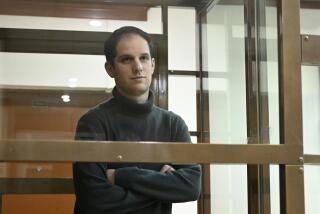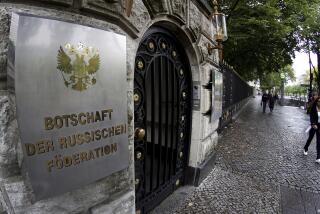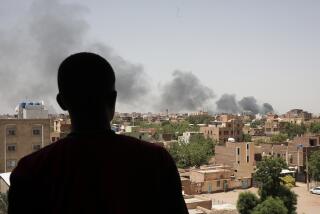Moscow Says It Won’t Expel Iraqi Envoys : Diplomacy: Soviets warn against adding “fuel to the fire” but concede that assisting Iraq’s army leaves the nation in moral conflict.
MOSCOW — Soviet Foreign Ministry spokesman Gennady I. Gerasimov this week criticized the U.S. expulsion of Iraqi diplomats as causing an escalation of tension in the Persian Gulf region. He said his country will not follow suit.
“I don’t believe that we have to add fuel to the fire in this explosive situation,” Gerasimov said Tuesday.
The official conceded, however, that the Soviet Union faces a moral conflict because Soviet military specialists continue to assist the Iraqi army, which is equipped chiefly with Soviet weapons.
On Monday, the United States expelled 36 of the 55 members of the Iraqi Embassy staff in Washington and encouraged other countries to act similarly.
The move was in response to Iraq’s demands that all foreign countries close their embassies in Kuwait, which Iraq has invaded and annexed. The United States and some other countries have refused to close their embassies in Kuwait. The staff of the Soviet Embassy has left, but the Kremlin maintains that the embassy is still legally open.
“Of course, Iraq’s actions to close embassies in Kuwait are illegitimate,” Gerasimov told reporters. “But if you use a tit-for-tat policy in this question, you risk falling into the spiral of escalation and aggravating the situation. We do not plan such action.”
Responding to questions, Gerasimov said that the Soviet Union, Iraq’s No. 1 arms supplier before the Aug. 2 invasion of Kuwait, is not breaking U.N. Security Council sanctions by keeping military specialists in Iraq.
“From the legal point of view, there are no violations,” he said. “But a moral problem does exist, and we will try to resolve it.”
After Iraq’s invasion of Kuwait, the Kremlin quickly cut off arms sales to the government of Saddam Hussein and has repeatedly denounced Iraq’s action. On Saturday, it supported a U.N. resolution authorizing the use of force by foreign naval forces blockading Iraq, but President Mikhail S. Gorbachev said his government has no plans to use force against its former ally.
“It is a delicate situation, so we are approaching it cautiously,” Gerasimov said, continuing to emphasize the use of diplomacy rather than force.
Earlier in the day, Gerasimov said, the first group of relatives of Soviet military specialists working in Iraq, 240 women and children, arrived in Moscow. He said all 983 military dependents are expected to be home by Saturday.
About 8,000 Soviet nationals, mostly oil workers, diplomats and dependents, were in Iraq at the time of the invasion. The 880 who were in Kuwait have already been evacuated. However, the Kremlin has announced no plans to pull out the approximately 5,000 Soviets remaining in Iraq, some of whom by Soviet admission have been training the Iraqis in the use of Soviet-made military equipment.
The 193 Soviet military specialists may not come home until their contracts run out, Gerasimov said, but he predicted that existing contracts will not be renewed and that no new contracts will be signed.
Several Soviet peace and disarmament organizations issued a joint statement calling for the withdrawal of all military specialists from Iraq until Iraq abandons its claim to Kuwait, the official Soviet news agency Tass reported.
Gerasimov said that although the Soviet government is staying in close contact with Baghdad in an effort to forge a political settlement, it does not want a special role as a go-between.
More to Read
Sign up for Essential California
The most important California stories and recommendations in your inbox every morning.
You may occasionally receive promotional content from the Los Angeles Times.










